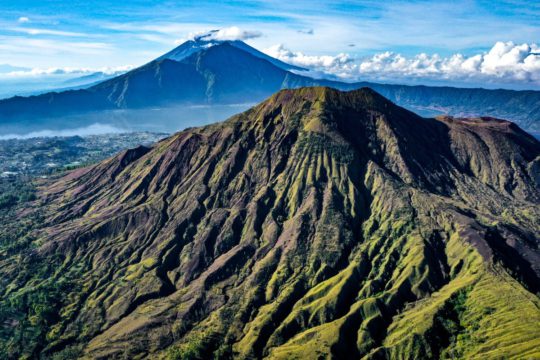Bali’s Governor, I Wayan Koster, has issued an official order outlawing the climbing of all major mountains in Bali.
“Because the mountains have already been granted ‘sacred’ status (bhisama), we are prohibiting the climbing of the mountains,” said Koster while speaking to the head of the Natural Resources Conservation Agency (BKSDA). R. Agus Budi Santosa, in a coordinating meeting on tourism held on Wednesday, 31 May 2023.
The Governor’s edict forbidding mountain climbing in Bali comes after incidents of irreverent moral outrage, including nude photos of foreign tourists standing atop the sacred mountains, have been reported in social media and the general press. Many Balinese have seen these incidents as transgressing the sanctity of these mountain areas.
Following the coordinating meeting, the Governor complained that whenever foreign visitors perform outrageous acts in locations considered sacred by the Balinese, such incidents trigger requirements for expensive and time-consuming cleansing rituals.
The Governor proclaimed 22 mountains in Bali are now completely closed to mountain climbers and tourist visitors. The closing of the mountain to visitors, climbers, and trekkers applies to both domestic and international visitors.
This prohibition is now in effect, and a provincial regulation will be issued that applies to both foreign and domestic tourists. Exemptions will apply for Bali-Hindu residents participating in religious ceremonies and special activities. Reportedly, tourist activities will no longer be allowed on the 22 mountains.
Government officials say the Governor’s prohibition is still being drafted for eventual promulgation. Therefore, it remains to be seen if the Sacred Temple Complex at Pura Besakih, which was recently upgraded and redeveloped at substantial public expense, will remain open to non-Hindu domestic and international visitors under the new Gubernatorial decree. Pura Besakih sits at an elevation of 1,000 meters on the slope of 3,000 meters high Mt. Agung.
. . . it remains to be seen if the Sacred Temple Complex at Pura Besakih, which was recently upgraded and redeveloped at substantial public expense, will remain open to non-Hindu domestic and international visitors under the new Gubernatorial decree. Pura Besakih sits at an elevation of 1,000 meters on the slope of 3,000 meters high Mt. Agung.
Separately, the Governor dismissed objections claiming his new policy would cause a loss of employment to local mountain guides. He argued that the Balinese must view this problem from a long-term and sustainable perspective. Koster said it is wrong to only think of the small groups that work as nature guides. Instead, he argued that the overall interest of Bali and tourism sustainability must be of primary consideration.
Koster said his just-announced prohibition is popular with most people in Bali. Meanwhile, the chairman of the Abang Mountain Tourism Awareness Group (Kelompok Sadar Wisata – Pokdarwis), I Nengah Suratnata, is calling on the Governor to review his new policing prohibiting mountain climbing activities. Suratnata said that while the sanctity of Bali’s mountains must be protected and preserved, this can be achieved without completely closing the mountains to visitors.
Suratnata estimates the daily average number of tourists climbing Mount Abang ranges between 10-50 people. If all mountain climbers from Kintamani, Bangli are counted, the average daily number increases to 30-100 people.
Related Articles
Facilities Upgraded at Pura Agung Besakih
Naked to the World from Bali’s Mt. Batur
Stay Informed on Bali Tourism-Related News: Subscribe to Bali Update
